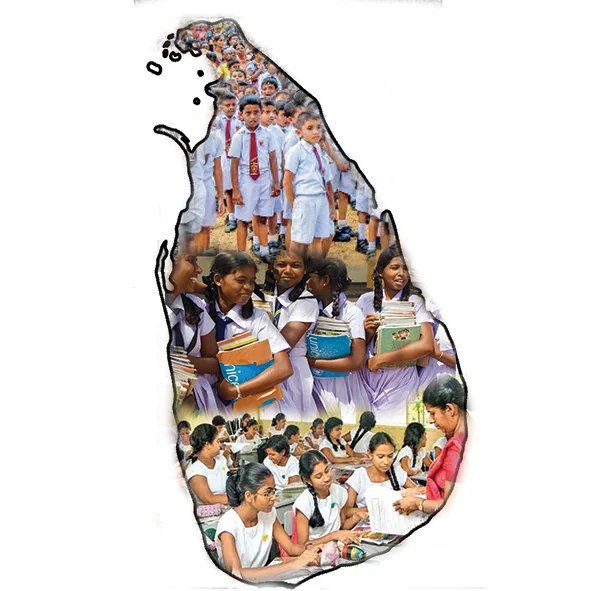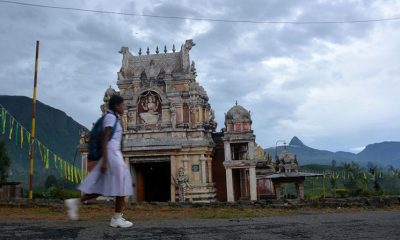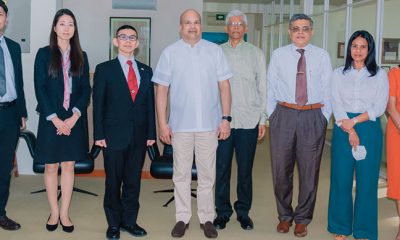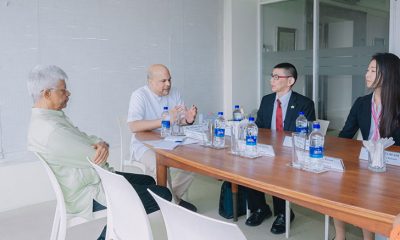Opinion
Climate change impacts human rights

Bangladesh along with all the member-states of the Climate Vulnerable Forum (CVF) is expected to support the resolution. At the same time, during Bangladesh’s tenure as the CVF chair, which concluded recently, she successfully lobbied for the creation of the post of a human rights rapporteur for Climate Change under the UN Human Rights Council based in Geneva, Switzerland. This was a very successful effort at diplomacy by the Permanent Mission of Bangladesh in Geneva: The Human Rights Council recently appointed Ambassador Ian Fry of Tuvalu as the new rapporteur for climate change and human rights. Ambassador
Fry was the climate envoy of Tuvalu for many years and was a lead negotiator on loss and damage in the UNFCCC.
BY SALEEMUL HUQ
The concept of humaninduced climate change originated from the scientific community based on the periodic assessment reports from the Intergovernmental Panel on Climate Change (IPCC), which was then picked up by policymakers at global levels. The United Nations Framework Convention on Climate Change (UNFCCC) was set up as a global treaty under which countries pledged to tackle climate change, initially by reducing emissions of greenhouse gases (GHGs) and then by adapting to the inevitable and unavoidable adverse impacts that were predicted to occur over time. Thus, dealing with climate change was mainly seen to involve switching from using fossil fuels to renewable energy globally over time, while also preparing each country to be more resilient to withstand the inevitable impacts.
However, after the publication of the 6th Assessment Report of the IPCC, it has become abundantly clear that the impacts of human-induced climate change are already upon us and will only get worse in the short and even medium terms. But the worst impacts in the long term may still be avoidable – if every country in the world takes stronger mitigation and adaptation actions. The world has already entered the era of loss and damage from human-induced climate change, and the adverse impacts are visible everywhere: from the recent floods in northeast Bangladesh to the heat waves in Europe and China. However, one of the new dimensions of this new era is that it is not equally distributed around the world. In fact, the worst impacts are felt by the poorest countries, as well as the poorest people even in the rich countries – as depicted by the recent floods in Kentucky, US.
Meanwhile, these impacts are being exacerbated by GHG emissions by mostly rich countries. Hence, there is now an element of causality introduced into the issue, where poor people who did not cause the problem are the worst victims of it. This is a violation of their human rights. This has opened up a new dimension of linking human rights to climate change, which is now beginning to play out in different platforms other than the UNFCCC. One such arena is the courts where cases are being brought forward under national laws in countries such as the US, the Netherlands, Germany and Australia, where citizens of these countries are holding their own governments to account for failing to take actions to reduce their GHG emissions. Recently, the Pacific Island countries, led by Vanuatu, took a resolution to the UN General Assembly to request an advisory ruling from the International Court of Justice (ICJ), which will be voted upon in the upcoming General Assembly session later this year.
Bangladesh along with all the member-states of the Climate Vulnerable Forum (CVF) is expected to support the resolution. At the same time, during Bangladesh’s tenure as the CVF chair, which concluded recently, she successfully lobbied for the creation of the post of a human rights rapporteur for Climate Change under the UN Human Rights Council based in Geneva, Switzerland. This was a very successful effort at diplomacy by the Permanent Mission of Bangladesh in Geneva: The Human Rights Council recently appointed Ambassador Ian Fry of Tuvalu as the new rapporteur for climate change and human rights. Ambassador
Fry was the climate envoy of Tuvalu for many years and was a lead negotiator on loss and damage in the UNFCCC. After his recent appointment, the rapporteur has decided to visit Bangladesh as part of his plan to visit the frontline countries suffering losses and damages from climate change. Most recently, the UN also passed a resolution making it a human right for everyone on Planet Earth to have a healthy environment. The environmental advocates had been lobbying for this for many years and finally succeeded. In less than a hundred days, countries will come together at the 27th UN Climate Change Conference – 27th Conference of Parties (COP27) – in Egypt, where the issue of finance for the victims of climate change will be high on the agenda. As the world is now living through the era of loss and damage where climate change and human rights are interlinked, we need to find ways to tackle both issues together to ensure climate justice.
(The Statesman/ANN)
Opinion
Learning from global models to address flooding and water shortage in Sri Lanka

by Sudharman Siripala
Sri Lanka is grappling with the increasing threat of climate change, which has led to unpredictable weather patterns. The country faces a dangerous combination of flooding in some regions and water shortages in others, a situation exacerbated by shifting rainfall patterns. Rivers originating in the Central Hills, such as the Mahaweli, Kalu, and Kelani, flow through much of the country, but these water sources are not being distributed evenly. Districts like Monaragala and Hambantota, located in the dry zone, are experiencing severe water shortages. To address this challenge, experts suggest the development of an interconnected river system to harness excess water during floods and redirect it to drier areas, ensuring a year-round water supply for agriculture and daily use.
Global Case Studies in River Management
Several countries facing similar water-related challenges have implemented successful water management systems that Sri Lanka could adapt to its unique circumstances:
The Netherlands – Room for the River Programme
The Netherlands, a country prone to flooding, widened its rivers and relocated dikes to create floodplains. This approach allows rivers to overflow without damaging urban areas, while preserving water flow and natural habitats. Sri Lanka could apply this concept by designating specific riverbank areas for temporary flood storage.
China – South-North Water Transfer Project
China’s massive project channels excess water from the flood-prone Yangtze River to drier northern regions. This system of canals and reservoirs could inspire Sri Lanka to divert water from rivers in the Central Hills to drier areas in the south and east.
Bangladesh – River Interlinking Projects
Bangladesh has implemented river interlinking projects to redistribute water from flood-prone rivers, such as the Brahmaputra, to drier regions. Sri Lanka could link its major rivers like the Mahaweli and Kelani to smaller rivers in water-scarce districts to balance water distribution.
India – National River Linking Project
India’s National River Linking Project connects major rivers to manage both floods and droughts. Sri Lanka could use similar strategies, connecting rivers around the 500-foot contour line in the Central Hills to help distribute water more effectively.
United States – Mississippi River and Tributaries Project
The Mississippi River system combines levees, floodways, and diversion channels to manage flooding. Sri Lanka could adopt similar flood-control measures in vulnerable river basins such as the Kelani and Kalu.
Japan – Underground Reservoirs and Flood Channels
Japan’s G-Cans Project in Tokyo channels excess water into underground reservoirs to prevent urban flooding. A similar underground system could be implemented in Colombo and other flood-prone cities in Sri Lanka.
Singapore – Marina Barrage
Singapore’s Marina Barrage serves as both a flood control measure and a water supply resource. Sri Lanka could develop similar systems to control flooding in urban areas and ensure water availability during dry spells.
Thailand – Chao Phraya River Basin Management
Thailand uses diversion channels in the Chao Phraya River Basin to prevent flooding in Bangkok and direct water to agricultural areas. Sri Lanka could replicate this by creating diversion channels to supply water to its agricultural zones.
Actionable Solutions for Sri Lanka
Develop an Interconnected River System
Establish water diversion channels along the 300-500 meter contour lines of the Central Hills to capture excess rainfall during floods and redirect it to drier areas.
Build Reservoirs and Storage Tanks
Construct reservoirs to store diverted water, ensuring a steady supply for agriculture and domestic use. Sri Lanka has around 14,000 ancient tanks out of 30,000 that could be revitalized for this purpose.
Improve Urban Flood Defenses
Drawing inspiration from Japan and Singapore, build underground reservoirs and flood channels in cities like Colombo to mitigate urban flooding.
Strengthen Watershed Management
Restore natural floodplains and create wetlands to absorb excess rainwater, as seen in the Netherlands, helping to reduce flood risks.
Encourage Public-Private Partnerships
Foster collaboration between the public and private sectors to fund large-scale water management infrastructure, leveraging models from China and the United States.
Leverage Technology
Utilise modern forecasting and real-time water management systems, similar to those in Bangladesh and Thailand, to monitor water levels and manage river flows dynamically.
International Collaboration
Form partnerships with countries that have successfully implemented flood control and water management systems to share expertise and technology.
Sri Lanka’s dual challenges of flooding and water scarcity, compounded by climate change, require immediate action. By developing an interconnected river system and learning from successful global water management models, Sri Lanka can mitigate the effects of floods while ensuring a sustainable water supply for agriculture and daily life. It is crucial for the country to act now, as these solutions have the potential to transform Sri Lanka’s water management system for the better.
Sudharman Siripala Managing Director of Geoinformatics Group and a Registered Licensed Surveyor, specializes in geo-spatial applications. He also serves as a freelance value chain consultant for Vivonta Green Tech Consultants (www.vivonta.lk)
Opinion
Doctor’s plight

Some people have found fault with a female doctor for not coming forward to identify her rapist and help make him pay for his crime.
Do they not realise the emotional toll of facing her rapist again?
There should be a way for survivors to testify directly to the judge without enduring such distressing encounters. Making a victim relive her trauma in this manner is akin to subjecting her to the ordeal all over again.
A Ratnayake
Opinion
Developing attitudes of schoolchildren for development

Sri Lanka was once at an economically comparable level with some of the world’s most developed countries in the 19th century. However, despite our country’s potential, we are still striving to fully develop. Many people often blame politicians, government officers, or various sectors for the situation. However, I believe the root cause of these issues lies not in any individual or group, but in the lack of good attitudes within our society.
We are investing significant resources into our education system, which is funded by the taxes of hard- working citizens. However, when we examine the outcomes, we realise that the academic achievements of our graduates alone are not enough. There are instances where professionals, despite having the necessary qualifications, fail to uphold ethical standards. In some cases, this even results in malpractice or harmful actions that damage our country’s reputation and progress. This highlights the gap between academic success and real-world responsibilities.
The education system, which is currently focused on competitive exams and rote learning, does not emphasise the development of attitudes and character in students. While our students are academically capable, many lack the qualities required to contribute positively to society. This lack of focus on social values, such as patriotism, selflessness and respect for elders, is holding us back from achieving the level of progress we deserve.
To address these concerns, I wrote to His Excellency, the President of Sri Lanka, on 24th September 2024, proposing education reforms that emphasise not only academic qualifications but also attitudes, ethics, and social responsibility. I suggested a holistic approach to university admissions and government recruitment, incorporating moral integrity, character, and extracurricular involvement, key traits for fostering well- rounded, responsible citizens. More importantly, I strongly recommended introducing a compulsory school subject, with both theory and practical components, focused on attitude development, which would be evaluated in university admissions. Encouraging extracurricular participation alongside academics will help shape ethical and socially responsible individuals.
I am pleased to inform you that the President, recognising the importance of these reforms, has directed the relevant ministries (by a letter dated 24th October 2024) to explore integrating these ideas into the education system. This marks a crucial step in transforming the values and attitudes of our youth for the nation’s benefit.
However, meaningful change requires collective effort. Parents, teachers, students, and citizens all play a role in shaping Sri Lanka’s future. Together, we must instill responsibility, ethics, and patriotism in the next generation. I invite you to share your thoughts and suggestions on further enhancing the values and attitudes of our youth. Your feedback will be invaluable in building a brighter future for Sri Lanka, one driven not just by knowledge, but by integrity and character.
Dr. Mahesh Premarathna
Research Fellow, National Institute of Fundamental Studies, Sri Lanka Email: mahesh.pr@nifs.ac.lk
-

 News6 days ago
News6 days agoSeniors welcome three percent increase in deposit rates
-

 Features6 days ago
Features6 days agoThe US, Israel, Palestine, and Mahmoud Khalil
-

 News6 days ago
News6 days agoScholarships for children of estate workers now open
-

 News7 days ago
News7 days agoDefence Ministry of Japan Delegation visits Pathfinder Foundation
-

 Foreign News4 days ago
Foreign News4 days agoBuddhism’s holiest site erupts in protests over Hindu ‘control’ of shrine
-

 News6 days ago
News6 days agoJapanese Defence Delegation visits Pathfinder
-

 Editorial7 days ago
Editorial7 days agoWhen promises boomerang
-

 Features3 days ago
Features3 days agoCelebrating 25 Years of Excellence: The Silver Jubilee of SLIIT – PART I











